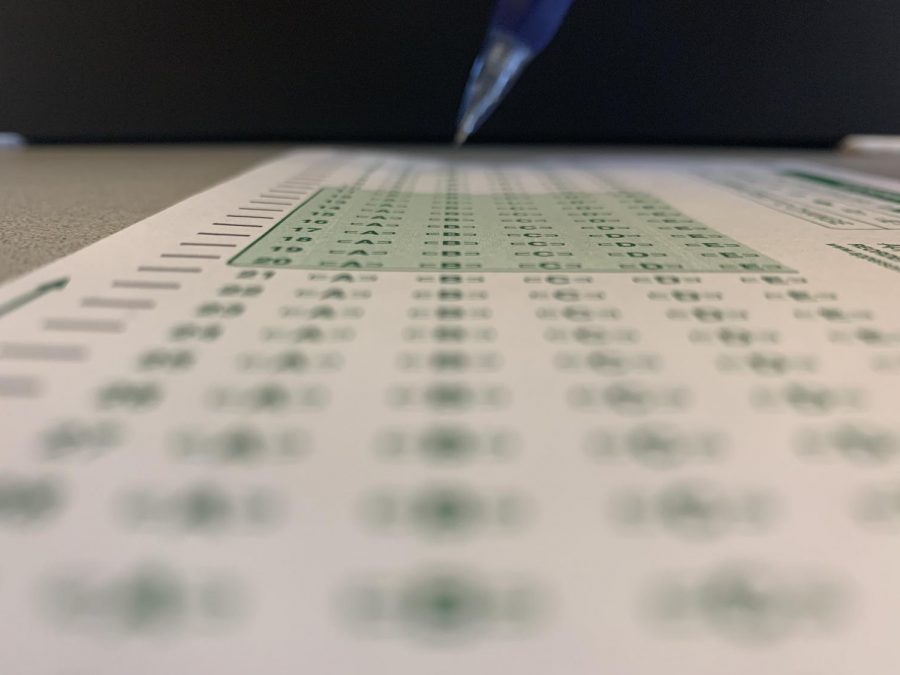The SAT and the ACT – Choosing A Test
Pencil poised to take a test. Scantrons like these are used by students across the school to take exams.
February 7, 2020
At some point in a student’s high school career, they will probably take either the SAT or ACT. Though the tests are similar, they certainly aren’t the same; yet students often don’t know the difference.
Carol Diebel, the College & Career Center Volunteer Coordinator, explained that the tests have a long history, originally developed to help soldiers understand their interests and talents.
“Since then, they’ve become measurements that colleges use — and some scholarship organizations — to see not just what students know in math, language arts or, in the case of the ACT, a bit of science principles; but now they’ve become scores. The actual scores that you can get in either of the scales have become something to study for and prepare for to be able to present,” said Diebel.
Diebel explained what the generally perceived differences are.
“People have thought of the ACT as being, in terms of the subject areas, a little bit more fact-oriented, a little bit more like a regular classroom exam, where you know the answer or you don’t,” Diebel said. “Whereas, with the SAT, it leans a little bit more towards critical thinking, so when you read the question, you generally need to stop and say ‘wait a minute, what is this question asking?’ and look for the answer in that way.”
Besides that, schools used the ACT and SAT in different regions. East Coast Prep schools created the SAT as a way to test critical thinking, while the school system in the Midwest created the ACT to test general comprehension of students. Diebel noted that as the tests grew, the opinions of the schools using them changed.
“Some of the university systems in California said ‘we’re considering not doing the SAT because some of the phrasing of the questions was not oriented to as wide a variety of the population as it needed to be,’” Diebel said. “And they considered saying to the SAT, ‘we’re not going to use you anymore,’ and the people at the SAT said, ‘no no no we’ll redo our test, we’ll be more careful with our wording.’ While they were revamping their test, the ACT came into wider usage, and more data from the ACT became available, and colleges realized that they were going to get more applicants if they allow students to take either one for this reason.”
Diebel mentioned that the requirements for test-taking has not only lightened-up over the years, but has also modified and changed with the times.
“The more competitive places to get into usually now say take the SAT or the ACT and its optional whether you take some subject tests,” said Diebel. “But we always say, ‘if you see the word optional that means do it.’ So, the actual requirements have gotten a bit better, but the SAT company and the ACT company are competitors, so they’re always trying to think of ways to get people to take their test.”
Students are often unsure which test they prefer, or if they want to take both, but Diebel had a great suggestion:
“There’s so many similarities from one ACT, to the next ACT, to the next, to the next, that you can take the ACT in practice form and get used to the methods behind it, the depth of the questions behind it, and even the pace by practicing it,” said Diebel. “And for the SAT, now that Khan Academy is a tutor that’s free, and is available to anyone in the whole world, you can take two or three practice tests with them, with the same purpose.”
Diebel added that despite the pressure put on these tests, it is not always the right choice to take them.
“If you go to the website of fairtest.org, it will get a whole list of schools that are test optional,” Diebel said. “For students who really struggle with test-taking, but they do extremely well in classes, […] it’s just that test-taking is hard for them. Looking at test optional schools is very helpful.”
Diebel said that there are resources for students who are struggling with these tests.
“For students who are worried about the test and have a lot of test anxiety, we would like them to come and talk to us, so that we can tell them more about how to take them, alternatives to the test, ways to be successful, ways to practice that they can reduce the stress and anxiety,” she said. “We think that our strongest message is that these tests don’t have to control your life, ruin your life. There’s lots of ways to get into college, improve yourself without spending an inordinate amount of time on test-taking. We want to help, that’s our strongest message.”














